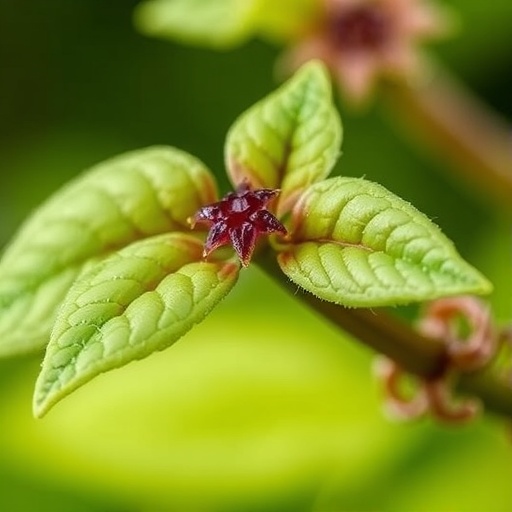In recent years, the exploration of natural compounds for therapeutic applications has gained significant traction in the biomedical field. This trend is particularly evident in the context of wound healing, where traditional medicine is increasingly being integrated into modern therapeutic regimens. A compelling study published in BMC Complementary Medicine and Therapies examines the potential of Mikania cordata, a perennial plant known for its medicinal properties, specifically focusing on its leaf extracts and their efficacy in fostering wound healing.
Mikania cordata, commonly found in tropical regions, has been used in traditional medicine to treat various ailments ranging from skin infections to inflammatory disorders. Packed with bioactive compounds, the leaves of this plant are believed to enhance tissue regeneration and support the body’s natural healing processes. In the investigation, researchers employed in vitro methodologies to rigorously assess the extracts’ properties and their implications in wound repair mechanisms.
The invigoration of interest in plant-based therapies has been bolstered by a growing body of evidence supporting their role in promoting healing through various biological pathways. This study set out to elucidate how Mikania cordata leaf extracts influence cellular activities pertinent to wound healing. By leveraging advanced extraction techniques, the researchers ensured that the active phytochemicals were harvested effectively, yielding a concentrated liquid that could be thoroughly analyzed for its beneficial effects.
The study’s methodology involved isolating various components of the leaf extracts, followed by a series of experiments designed to assess their impact on cells involved in the healing process. Key observations were made on cellular proliferation, migration, and the synthesis of critical extracellular matrix components which are essential for wound closure. These parameters provide a robust framework for understanding how these extracts could be utilized therapeutically to enhance wound healing outcomes.
One of the significant findings of this research was the promotion of fibroblast migration, a crucial step in the wound healing cascade. Fibroblasts play a vital role in synthesizing the extracellular matrix and collagen, which are integral for tissue integrity and repair. The researchers observed that the application of Mikania cordata extracts notably elevated fibroblast activity, suggesting that these extracts could potentially expedite the wound healing process by enhancing cellular movement and activity at the injury site.
Additionally, the study scrutinized the anti-inflammatory properties of Mikania cordata. Chronic inflammation is a major barrier to effective wound healing, often prolonging recovery and complicating treatment. The research found that the leaf extracts demonstrated a remarkable ability to modulate inflammatory cytokine production. By reducing the levels of pro-inflammatory markers, Mikania cordata could mitigate the inflammatory response and thus foster a more conducive environment for healing.
The chemical constituents of Mikania cordata have been the subject of extensive investigation, particularly the polyphenols, flavonoids, and tannins present in the leaf extracts. These compounds are well-documented for their antioxidant and anti-inflammatory properties, lending credence to their therapeutic potential. In this study, the researchers underscored the importance of these metabolites in promoting skin regeneration and reducing oxidative stress at the wound site.
Moreover, the authors discussed the implications of their findings within the broader context of wound management. The increasing incidence of chronic wounds, resulting from diabetes, obesity, and an aging population, necessitates innovative and effective treatments. The application of plant-based extracts like Mikania cordata might offer a dual advantage: enhancing healing while mitigating ethical concerns associated with synthetic pharmaceuticals.
The study also emphasizes the need for further exploration and validation of Mikania cordata’s efficacy in clinical settings. While in vitro results are promising, translating these findings into tangible clinical benefits requires thorough investigation, including randomized controlled trials. Researchers are optimistic that with appropriate funding and collaborative efforts, the potential of Mikania cordata can be fully realized in wound care strategies.
As we advance into an era marked by the convergence of traditional knowledge and scientific innovation, studies like this open valuable avenues for the development of novel therapeutic agents. The promise of natural compounds, particularly those like Mikania cordata, highlights the untapped resources that nature offers in the quest for better healthcare solutions.
Towards the end of their discussion, the authors call for a multidisciplinary approach that includes botanists, pharmacologists, and clinicians to fully explore the breadth of Mikania cordata’s capabilities. By fostering collaboration across disciplines, the translation of such findings into practical treatments can be expedited, potentially leading to breakthroughs in how we manage and treat wounds moving forward.
In a climate where antibiotic resistance and chronic disease prevalence are rising, the exploration of plant-derived therapies is both timely and necessary. Mikania cordata stands as a testament to the wealth of remedies that nature provides and the scientific inquiry that brings these options to light. As more studies like this proliferate, they contribute to a paradigm shift in how we understand and implement treatment methodologies, paving the way for a future where natural products play a pivotal role in modern medicine.
In conclusion, the ongoing research into Mikania cordata represents much more than just an academic inquiry; it is a glimpse into the potential future of medicine, where nature and science intertwine to create holistic and effective solutions for pressing health challenges. As the field of complementary medicine continues to evolve, the insights gained from such studies will undoubtedly shape protocols, inspire innovations, and enhance our collective approach to health and healing.
Subject of Research: The in vitro effect of Mikania cordata leaf extracts on wound healing.
Article Title: In vitro effect of Mikania cordata leaf extracts on wound healing.
Article References:
Vijithsingh, N.N., Anuradha, K., Handunnetti, S.M. et al. In vitro effect of Mikania cordata leaf extracts on wound healing.
BMC Complement Med Ther 25, 366 (2025). https://doi.org/10.1186/s12906-025-05110-7
Image Credits: AI Generated
DOI: 10.1186/s12906-025-05110-7
Keywords: Mikania cordata, wound healing, in vitro, fibroblast, inflammation, natural compounds.




